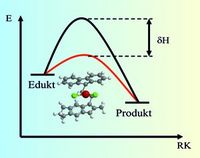Catalysis - Molecular Systems

Heterogeneous polymerization of olefins on silica gels is an important topic being investigated in the Institute of Silicon Chemistry. Heterogeneous polymerization is the most-used large-scale process for the production of polymers in industry. Therefore, the optimization of supporting materials is essential.
Another interesting topic is the improvement of polyolefin functionalization with silanes.
To date, polyolefins (specifically polyethene (PE) and polypropene (PP)) are the most important commercial polymers. Due to the combination of their excellent chemical- and physical properties and their low production costs these materials find a extremely broad range of applications.
Modification of polyolefines with functional groups leads to polymers with new properties. E.g., polar functional groups ensure good adhesion on different substrates such as glass or ceramic, allowing good printability or dyeability. The introduction of functional groups into a polymer chain may be achieved either by a direct incorporation during the polymerization process via copolymerization of an α-olefin with a polar comonomer or by end-group functionalization via a controlled termination reaction with polar compounds. The second method is the chemical modification of preformed polymers.
The functionalization with silane-containing molecules is of great economical interest. I.e., a process for crosslinking of polyethylene, the Sioplas process, was developed in 1968. In this process, polyethylene is grafted with alkoxysilanes for subsequent crosslinking. An alternative possibility to form silane functionalized polyethylene is the radical copolymerization of ethylene and vinylsilanes at high pressure. Both processes do not work with propylene due to the stability of the allyl radical.
Metal catalyzed copolymerization of alpha-olefins with vinylsilanes seems a very promising alternative to overcome this problem yielding a defined polymer backbone and allowing the copolymerization of propylene with silane containing monomers. However, there are only few examples for metal-catalyzed copolymerizations of polar silane-containig monomers with alpha-olefins.
The copolymerization of oelfins with alkoxysilanes is of great interest as the resulting polymers are curable with water and temperature enabling a wide range of applications.